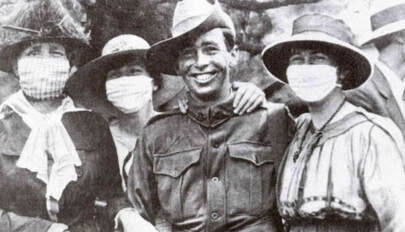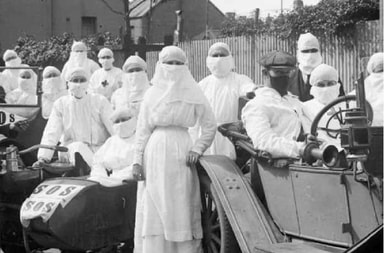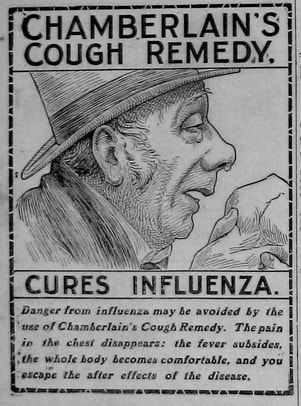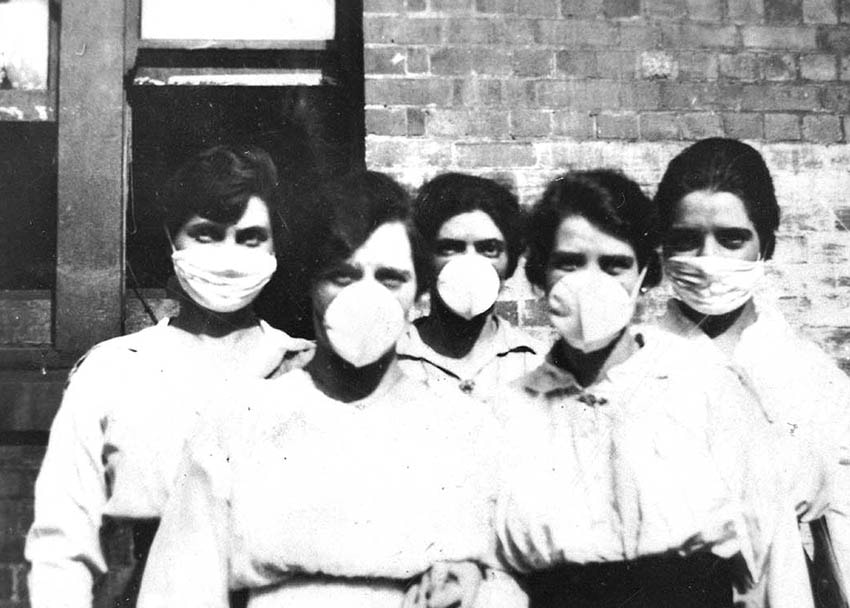 An Australian soldier returning from the battlefields of World War 1 in early 1919 is welcomed home by relatives who are taking no chances.
An Australian soldier returning from the battlefields of World War 1 in early 1919 is welcomed home by relatives who are taking no chances. By Carolyn Landon
“SPANISH Flu” or “La Grippe”, the influenza epidemic of 1918-19, was a global disaster that killed more people than the Great War, and more people in a single year than four years of the Black Plague 300 years earlier.*
It erupted in the world just as the First World War was ending and soldiers were being de-mobbed en masse from Europe back to their home countries. Of course, towns like Wonthaggi were preparing for welcoming celebrations of each returned soldier. A few such celebrations were reported in late 1918 as the first soldiers began to trickle back home.
On November 29 1918, the Sentinel reported that Private George Wall, who had been gone since 1914, returned home to Wonthaggi on the morning train:
“SPANISH Flu” or “La Grippe”, the influenza epidemic of 1918-19, was a global disaster that killed more people than the Great War, and more people in a single year than four years of the Black Plague 300 years earlier.*
It erupted in the world just as the First World War was ending and soldiers were being de-mobbed en masse from Europe back to their home countries. Of course, towns like Wonthaggi were preparing for welcoming celebrations of each returned soldier. A few such celebrations were reported in late 1918 as the first soldiers began to trickle back home.
On November 29 1918, the Sentinel reported that Private George Wall, who had been gone since 1914, returned home to Wonthaggi on the morning train:
“He was accorded a splendid reception at the railway station where a large enthusiastic crowd gathered to do him honour. On alighting from the train his relatives were the first to greet him in the good old way. Then members of the reception committee and others grasped his hand and expressed their pleasure at his return. The approach to the station was lined by hundreds and the decorated car which conveyed Private Wall to his home was held up while the public gathered round and spoke words of welcome. Flags waved everywhere, ‘Home Sweet Home’ and the National Anthem were sung, and cheers followed cheers…”
At the same time, news of a terrible flu was coming into the country. On December 20 1918 The Sentinel reports of the ‘ravages of pneumonic influenza’ in South Africa. The report is based on a letter from a Mr Van Damme written two months earlier to his family in Bendigo. The article states that Mr Van Damme had just recovered from the flu, but that “Already half the community had died from it. It was the worst plague ever known here and whole families had been wiped out … Chemist shops were the only businesses left open and people lined up in queues to get medicine which was handed out free to the poor.”
Celebrations for returning soldiers were put on hold when several known cases of the flu in Wonthaggi were reported in The Sentinel on 7 February 1919. “Last Friday afternoon [February 1, 1919] the first suspicious case [a nurse at the hospital] came under the notice of Dr Sleeman, health officer, and he promptly quarantined the institution … Since then other cases have occurred and the health officer has closed public halls and churches. The State and Catholic Schools are closed indefinitely.”
A huge clean-up of the town was undertaken, starting with the flushing of all drains. The Wonthaggi Town Hall was set up as a hospital and several large tents were put up next to the hospital to accommodate the emergency that Sleeman knew was about to happen. Citizens began hunting up beds and supplies as best they could. Money had to be found for stretchers, the isolation tents and blankets.
At the same time, news of a terrible flu was coming into the country. On December 20 1918 The Sentinel reports of the ‘ravages of pneumonic influenza’ in South Africa. The report is based on a letter from a Mr Van Damme written two months earlier to his family in Bendigo. The article states that Mr Van Damme had just recovered from the flu, but that “Already half the community had died from it. It was the worst plague ever known here and whole families had been wiped out … Chemist shops were the only businesses left open and people lined up in queues to get medicine which was handed out free to the poor.”
Celebrations for returning soldiers were put on hold when several known cases of the flu in Wonthaggi were reported in The Sentinel on 7 February 1919. “Last Friday afternoon [February 1, 1919] the first suspicious case [a nurse at the hospital] came under the notice of Dr Sleeman, health officer, and he promptly quarantined the institution … Since then other cases have occurred and the health officer has closed public halls and churches. The State and Catholic Schools are closed indefinitely.”
A huge clean-up of the town was undertaken, starting with the flushing of all drains. The Wonthaggi Town Hall was set up as a hospital and several large tents were put up next to the hospital to accommodate the emergency that Sleeman knew was about to happen. Citizens began hunting up beds and supplies as best they could. Money had to be found for stretchers, the isolation tents and blankets.
 Flying medical squad, Sydney, April 1919. Photo: NSW State Archives
Flying medical squad, Sydney, April 1919. Photo: NSW State Archives By February 28, the paper reported, “There are now twenty cases at the hospital and the tent accommodation is full up … The Town Hall has been fitted up for the reception of other cases that may occur and Nurse Jeremiah has been placed in charge. Valuable assistance has been rendered in many ways by a number of ladies.”
On March 7, a large headline on page three announced: STATE SCHOOL TO BE USED AS HOSPITAL: “Cr Dowling, Mayor, wired the Town Clerk, ‘Prepare school; thirty beds being sent immediately.’ This means the deputation to Melbourne has been successful and that the use of the school has been granted as a temporary hospital. No mention of nurses is in the wire, but we take it they will be supplied by the government.”
Ads began appearing in the paper such as:
DALYSTON RACE PICNIC CLUB
This meeting announced to be held on Friday 21 March has been ABANDONED – G.Gary, honourable secretary.
OWING TO THE INFLUENZA EPIDEMIC THE DALYSTON SHOW has
been ABANDONED – J.D.Daly, sec’y.
LABOR DAY SPORTS ABANDONED!
Other ads requested help from the public in supplying eggs, poultry and rabbits to “help the sick and suffering”.
The Mayor, Cr Dowling, wrote a letter to the Editor asking for donations from the public of dairy products, “including eggs and milk and linen and the like”. He asked that all articles be forwarded to the Wonthaggi Railway Station.
Messages of thanks began to appear from those who had survived. John Bromely from Powlett River writes, “I the undersigned desire to thank Dr Jeilbart, also the Matron, Sisters and nurses for their kind and skilful attention to me during my recent illness at the Wonthaggi Town Hall.”
And, of course, bereavement messages filled columns of the paper.
Many kind, and possibly misguided, people began sending in letters filled with home remedies for this flu. Someone who signed the letter as ‘One in Sympathy’ wrote: “I would recommend the hydropathic treatment as follows: as soon as the patient shows symptoms of cold, put to bed. Put on four gallons of water to get very hot; mix four teaspoons of mustard in cold water, put into hot water; double a blanket into four folds, enough to cover the patient’s back; place in the hot water and mustard and ring out by placing between two towels…” Writer goes on to say the patient should be covered top and bottom by such hot blankets and be made to sweat, keeping a cold cloth on the forehead. On top of that he should be given a good dose of castor oil a allowed to eat only barley and milk.”
On March 7, a large headline on page three announced: STATE SCHOOL TO BE USED AS HOSPITAL: “Cr Dowling, Mayor, wired the Town Clerk, ‘Prepare school; thirty beds being sent immediately.’ This means the deputation to Melbourne has been successful and that the use of the school has been granted as a temporary hospital. No mention of nurses is in the wire, but we take it they will be supplied by the government.”
Ads began appearing in the paper such as:
DALYSTON RACE PICNIC CLUB
This meeting announced to be held on Friday 21 March has been ABANDONED – G.Gary, honourable secretary.
OWING TO THE INFLUENZA EPIDEMIC THE DALYSTON SHOW has
been ABANDONED – J.D.Daly, sec’y.
LABOR DAY SPORTS ABANDONED!
Other ads requested help from the public in supplying eggs, poultry and rabbits to “help the sick and suffering”.
The Mayor, Cr Dowling, wrote a letter to the Editor asking for donations from the public of dairy products, “including eggs and milk and linen and the like”. He asked that all articles be forwarded to the Wonthaggi Railway Station.
Messages of thanks began to appear from those who had survived. John Bromely from Powlett River writes, “I the undersigned desire to thank Dr Jeilbart, also the Matron, Sisters and nurses for their kind and skilful attention to me during my recent illness at the Wonthaggi Town Hall.”
And, of course, bereavement messages filled columns of the paper.
Many kind, and possibly misguided, people began sending in letters filled with home remedies for this flu. Someone who signed the letter as ‘One in Sympathy’ wrote: “I would recommend the hydropathic treatment as follows: as soon as the patient shows symptoms of cold, put to bed. Put on four gallons of water to get very hot; mix four teaspoons of mustard in cold water, put into hot water; double a blanket into four folds, enough to cover the patient’s back; place in the hot water and mustard and ring out by placing between two towels…” Writer goes on to say the patient should be covered top and bottom by such hot blankets and be made to sweat, keeping a cold cloth on the forehead. On top of that he should be given a good dose of castor oil a allowed to eat only barley and milk.”

Another home remedy comes from Malfa, Italy, “a town that was kept free of influenza when it raged through Italy”. “Rub over eyebrows, top lip and around ears: 2 grains of formalin, ½ oz of eau de cologne and ½ a crushed garlic. And take every second morning: ½ oz senna leaves; ½ oz sarsaparilla root, ½ oz ground ginger in 1 quart of boiling water. And if feverish and cold on the back, take 1 pint dry claret, 1 oz am. tincture of quinine, 1 oz crushed garlic mixed.”
There is a notification from a doctor at Fairfield Infectious Diseases Hospital that of the 29 patients who had died there, it had taken only seven days between onset of the illness and death, but if patients had come to hospital within two days of contracting the flu they all survived.
At the Wonthaggi hospitals – tents, school and town hall – the first deaths occurred on March 14 with 100 people in care. One week later the deaths had risen to 16 with 130 patients in the hospitals. There was also one birth recorded at the State School. The following week there were six more deaths, but statistics were beginning to turn around.
On March 28. it was reported that “80 people were in hospital, 3 being classed dangerously ill, 8 seriously ill as against 43 last week.”
Only one week later, it was reported that there were two deaths the previous week and now only 36 people in the hospital, “and the indications are that the epidemic is almost over. With two or three exceptions all patients are reported to be doing well.”
That same week the Union Theatre announced that after being closed for several weeks, it would be open the following Saturday when selected pictures would be shown.
Finally, here is a letter from Nurse M. McIntyre, who was presented with £12 raised by private subscription once the epidemic subsided and the hospitals were closed: “I would be very grateful to be allowed through the medium of your paper to express my sincerest thanks to the people of Wonthaggi for their kindness to me during my illness at State School Influenza Hospital. Although my period of service was unfortunately not lengthy, I feel that my efforts, though humble, were most nobly appreciated by the admirable spirit of good feeling and generosity of the townspeople. I cannot fully express my fondest remembrance of the residents of Wonthaggi.”
On April 25 1919, Wonthaggi was recovered enough from the ravages of the Spanish flu to celebrate the fourth Anzac Day in honour of its returned soldiers. An article in The Sentinel talks about Australian reputation “bought at a price of blood and emerging from her fiery baptism with her honour unsullied and a pardonable pride in the exploits of her fighting men”.
Extracts from The Sentinel, February 7, 1919 to April 25, 1919
* According to the Centres for Disease Control and Infection, some 500 million people or one-third of the world’s population were infected with the Spanish influenza virus and at least 50 million people died.
This essay was first published in The Plod, the newsletter of the Wonthaggi & District Historical Society.
There is a notification from a doctor at Fairfield Infectious Diseases Hospital that of the 29 patients who had died there, it had taken only seven days between onset of the illness and death, but if patients had come to hospital within two days of contracting the flu they all survived.
At the Wonthaggi hospitals – tents, school and town hall – the first deaths occurred on March 14 with 100 people in care. One week later the deaths had risen to 16 with 130 patients in the hospitals. There was also one birth recorded at the State School. The following week there were six more deaths, but statistics were beginning to turn around.
On March 28. it was reported that “80 people were in hospital, 3 being classed dangerously ill, 8 seriously ill as against 43 last week.”
Only one week later, it was reported that there were two deaths the previous week and now only 36 people in the hospital, “and the indications are that the epidemic is almost over. With two or three exceptions all patients are reported to be doing well.”
That same week the Union Theatre announced that after being closed for several weeks, it would be open the following Saturday when selected pictures would be shown.
Finally, here is a letter from Nurse M. McIntyre, who was presented with £12 raised by private subscription once the epidemic subsided and the hospitals were closed: “I would be very grateful to be allowed through the medium of your paper to express my sincerest thanks to the people of Wonthaggi for their kindness to me during my illness at State School Influenza Hospital. Although my period of service was unfortunately not lengthy, I feel that my efforts, though humble, were most nobly appreciated by the admirable spirit of good feeling and generosity of the townspeople. I cannot fully express my fondest remembrance of the residents of Wonthaggi.”
On April 25 1919, Wonthaggi was recovered enough from the ravages of the Spanish flu to celebrate the fourth Anzac Day in honour of its returned soldiers. An article in The Sentinel talks about Australian reputation “bought at a price of blood and emerging from her fiery baptism with her honour unsullied and a pardonable pride in the exploits of her fighting men”.
Extracts from The Sentinel, February 7, 1919 to April 25, 1919
* According to the Centres for Disease Control and Infection, some 500 million people or one-third of the world’s population were infected with the Spanish influenza virus and at least 50 million people died.
This essay was first published in The Plod, the newsletter of the Wonthaggi & District Historical Society.
